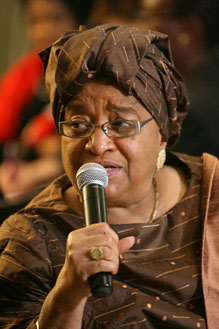
President Ellen Johnson-Sirleaf addresses the guests at a breakfast event
July 11, 2008 – Liberian President Ellen Johnson-Sirleaf spoke of women’s ability to build peace and a better Africa if they worked together, at a breakfast for women leaders in business and government in Johannesburg this morning.
And wife of Mr Nelson Mandela, Mrs Graça Machel, called on the women present to commit themselves to working together with women from Liberia to rebuild that country’s ruined economy.
The breakfast was hosted by the Nelson Mandela Foundation, Mrs Machel, and the Gordon Institute of Business Science (GIBS), where it took place.
President Johnson-Sirleaf is in the country as the keynote speaker of the Sixth Nelson Mandela Annual Lecture, to be held tomorrow in Kliptown, Soweto. The event coincides with Mr Mandela’s 90th birthday.
“How very pleased I am to be here, to be part of Nelson Mandela’s 90th birthday celebrations,” said Johnson-Sirleaf. “So many women in Liberia have played such important roles, especially in attaining peace,” she said. “Once peace was restored, women decided that the time had come for women leadership. It was now their time.”
Johnson-Sirleaf spoke about the challenges facing Liberians as they rebuild their nation after more than a decade of civil war, and the successes already achieved. She praised the fact that South Africa had so many women in government, saying that Liberia could not compete with this record. “What we did do was say we’ll put women in charge at strategic places – we’ll put them in charge of the money,” she added, to laughter and applause from the audience.
She also singled out South African President Thabo Mbeki, and the contributions he made in encouraging the African Union to pass a resolution to ensure 50:50 gender representation in its structures.
Johnson-Sirleaf acknowledged the fact that what she is doing now will have an impact on what women leaders will do in Africa in the future. “It is an awesome responsibility,” she said.
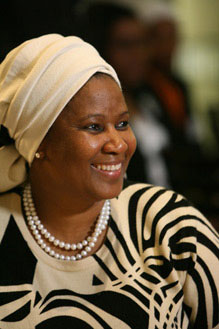
South African Deputy President Phumzile Mlambo-Ngcuka
South African Deputy President Phumzile Mlambo-Ngcuka was then invited to respond to Johnson-Sirleaf. Mlambo-Ngcuka spoke of Johnson-Sirleaf’s presidential candidacy and how South African women prayed for her and worried for her safety. “When she triumphed, it was a true moment of glory. South Africa sent a large delegation to her inauguration,” she said.
She spoke of the need to achieve equal representation in South Africa, saying, “We need to make sure those who aspire to office, those who inspire us, are supported.” She also told guests of the potential for investment in Liberia. “There are great things we can do together,” she concluded.
After Johnson-Sirleaf and Mlambo-Ngcuka had addressed the breakfast, MC Cheryl Carolus asked for questions and comments from the floor.
Prominent businesswoman and human rights activist Mamphela Ramphele was the first to take the microphone. “We can’t tell you just how proud we are to be on the same continent,” she told Johnson-Sirleaf. “Madam President, you are building what has been broken and we have a lot to learn from you. Looking back, we didn’t pay enough attention to rebuilding our social fabric. We can learn from Liberia, to make every young person feel valued and needed.”
Sibongile Makhabela, CEO of the Nelson Mandela Children’s Fund, asked, “How do you keep civil society alive and engaged? So it doesn’t always become, ‘government must do, and government must deliver’.”
Schoolgirl Phumelela Breakfast asked Johnson-Sirleaf very directly, “How did you do it?”
In response to these questions, the Liberian president said, “One takes courage when you see there are so many people who support you. When you move up the ladder of success, it picks up a momentum of its own.
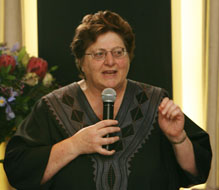
Gill Marcus
“Restoring the social fabric of the nation is something we are grappling with. Young people in Liberia have spent more time at war than in school. The challenge is to restore family values, and we haven’t found the answer.” She said there had been some successes with counselling programmes, but there was still much to do.
She also talked about the importance of civil society, without which a government can become disconnected from the people. And she emphasised the importance of “carrying the grassroots women. Too often, we get into our professional cocoons and forget that the real power lies there. In Liberia, they are the poor, the marketeers, the farmers. In hard times, they provide society with what it needs, yet they are the most vulnerable. We need that critical mass of women.”
These remarks were followed by more questions from the floor.
“Our independence as women has to be realised through economic development and economic empowerment,” said Thandi Orleyn, a human rights activist-turned businesswoman who has worked in Liberia.
Next, iconic South African singer Sibongile Khumalo asked, “How do we harness the healing energy of women? … I was enthralled to hear the language you use. ‘Relanguaging’ seems to be at the core of who you are. We need to use a new language. For example, when do we stop talking about ‘fighting poverty’, and instead talk about ‘wealth creation’?”
Media personality Tumi Makgabo asked the president how she was able to communicate her dreams and inspiration to the people of Liberia, while businesswoman Nwokedi remarked on the high degree of entrepreneurialism she had encountered in even the poorest parts of the country while working there recently.
Director-general of the North West Province, Nana Magomola, reminded the audience, “As we develop our girls, we mustn’t leave the young men behind. We want our daughters to marry good men!”
Graça Machel, was next to speak. “Ellen,” she said, “We are so, so delighted, so honoured, we take so much pride in everything you are, you mean – you have become the best of the best among African women … You have broken the ceiling for us!”
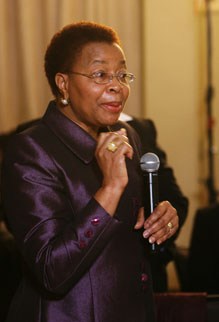
Graça Machel
Then Machel called on the women present. “This breakfast was organised for us to take responsibility; to support her. She’s told us by practice, there’s nothing a woman can’t achieve!”
But, added Machel, “It’s very cold up there, where she is. She needs all of us; she needs to feel that the millions of African women are with her. We have to go to Liberia to support her. We need to ask, in my sector, in my organisation, what can I do? It has to be intentional.”
Machel proposed sending a delegation of South African businesswomen to Liberia, to explore ways that they and Liberian women could work together. She suggested this be done immediately, so that South African and Liberian women could celebrate International Women’s Day on March 8 2009 together in Monrovia, the Liberian capital, with some concrete proposals. “I know we will not let her down, we will do it,” said Machel.
Carolus then called on Winnie Madikizela-Mandela to say a few words.
“Thank you, Mama President, for the opportunity to bring these girls together,” said Madikizela-Mandela. “We still think that in order to be what we are, we have to be defined by men. But we have the power to make ourselves what we want to be!”
Madikizela-Mandela called on those present to not only participate in business, but also in government, especially as there is a general election in 2009. “I’m calling on these women, as some of the top businesswomen and brains in South Africa, and asking, ‘What kind of government are we going to have in 2009?’”
Johnson-Sirleaf addressed some of the remarks from the floor briefly. “In response to the comments on entrepreneurialism,” she said, “Survival is the greatest human instinct. Years of hardship in Liberia have built strength and resilience. Fifty percent of our population had to flee.”
She concurred with Magomola’s comment about empowering boys as well as girls. “We can’t leave the boys behind, I agree there.”
Answering Makgabo’s question about inspiring people, Johnson-Sirleaf said, “Women’s greatest power is that you can motivate people to do things you set out to do, that you can, as was one of my election promises, make the children smile again.”
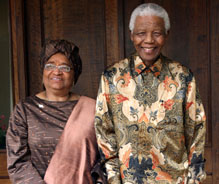 President Johnson-Sirleaf with Madiba
President Johnson-Sirleaf with MadibaShe added, “Come, as Graça has called you to do, to connect with Liberian women … We can build a coalition, to send a message all over Africa, that working as women together is an idea whose time is now.”
In closing, Gill Marcus of the Gordon Institute for Business, said, “I think this breakfast has created a new energy. Our future is a contested terrain and we need to engage. We need to build the partnership of women, instead of retreating into our shells. … The challenge for us is one of courage – to be the women we can be in our country, and on our continent.”
After the breakfast, President Johnson-Sirleaf met with Madiba.
Reflections
Sonja Sebotsa
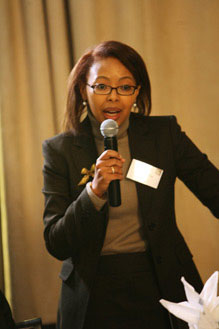
Sonja Sebotsa
Businesswoman Sonja Sebotsa said after the breakfast, “It was an amazing opportunity to meet with such iconic women from the continent. It came across again and again that even though they are so important they kept reminding us how we needed to stay in touch with grassroots women. We need to go away with a sense of respect and balance.”
Zenani Dlamini
Zenani Dlamini, eldest daughter of Nelson Mandela and Winnie Madikizela-Mandela, said, “It was truly inspirational. I admire most of the women in the room today. It is a privilege to be here with so many, all bought together. It is truly empowering to hear these speeches.”
Sibongile Mkhabela
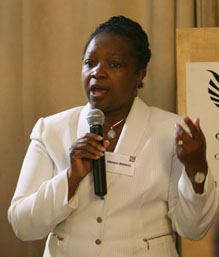
Sibongile Mkhabela
Sibongile Mkhabela, the Nelson Mandela Children’s Fund chief executive officer, said, “Wow! This breakfast brought me to the realisation that we’re all saying the same things. Hey, we’re amazing!”
Mothomang Diaho
Mothomang Diaho, head of the Dialogue Programme at the Nelson Mandela Foundation, said “I think the highlight for us was the sheer energy and positivity in the room. We take away the energy to take this forward.”
Thandi Orleyn
Thandi Orleyn, businesswoman and human rights activist, said, “For me, what was special was the cohesion, the strength, the inner core of women coming together and reiterating their commitment to the continent, and knowing we have so much in common. The commitment is continuing.”
Mamphela Ramphele
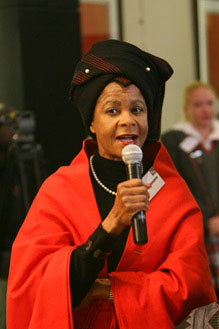
Mamphela Ramphele
Mamphela Ramphele is a businesswoman, activist and medical doctor. She said, “I think this is a great way of celebrating a great man’s birthday and redefining what African leadership should be. It need not be about control, it’s about inspiration.”
Josina Machel
Josina Machel, daughter of Samora Machel and Graça Machel, said, “It was fantastic. We as women tend not to celebrate ourselves or support each other, but today we came together, despite our differences, because we are women. We carry the torch, and sometimes the light only shines on one of us, but if we are holding hands, then we can make a real difference in our lives.”
Zindzi Mandela
Zindzi Mandela, daughter of Nelson and Winnie Madikizela-Mandela, said, “It is wonderful to be here with such dynamic women. The challenge is in the translation of what has been said. It is the same challenge facing the Foundation: how do we continue this legacy beyond the man? I think we need to keep talking, and make a commitment to recreating the village and revisiting the indigenous knowledge.”
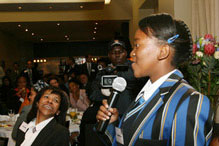
Phumelela Breakfast
Phumelela Breakfast
Schoolgirl Phumelela Breakfast said, “It was very inspirational. I have been feeling very down about exams and this has helped me to be strong.”